
09/07/2025
Deputy Minister of Communications: Investing in the Nation’s Talent is the Cornerstone of Building a Thriving Digital Economy in the intelligent age
Safa AlRashed, Acting Deputy Minister for Future Skills and Jobs at the Ministry of Communications and Information Technology (MCIT), affirmed that building a diverse and robust digital economy in line with the Saudi Arabia’s Vision 2030 relies on the Kingdom’s success in investing in its people - its female and male youth - as the driving force of the smart era economy.
Speaking at a panel discussion in Riyadh titled “Empowering the Workforce of Tomorrow: Insights from Vision 2030”, AlRashed emphasized that equipping national talent with future skills forms the foundation for strengthening the Kingdom’s position as a global destination for innovation and a hub for human capital development.
She highlighted that the Kingdom has achieved remarkable progress in this field, now home to the largest pool of digital talent in the region with more than 389,000 professionals in digital professions, and over 200,000 beneficiaries of nationwide digital literacy programs. Saudi universities have also integrated technology and artificial intelligence courses into their curricula, with women playing a vital role, representing 35% of the sector’s workforce—surpassing both the global average and G20 countries, and growing significantly from a baseline of 7% in 2018.
AlRashed underscored that the Kingdom’s strategy focuses on preparing a workforce capable of continuous learning, adapting to change, and fostering a culture of innovation, while also expanding partnerships between the public and private sectors and academic institutions.